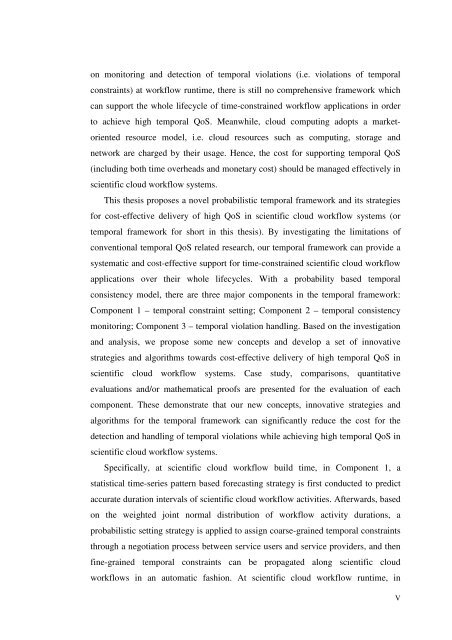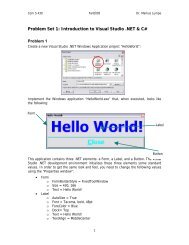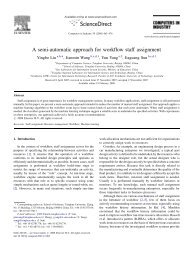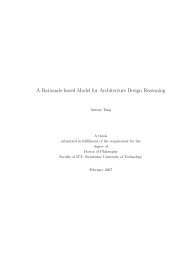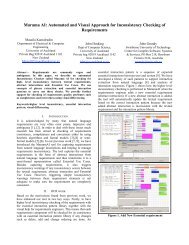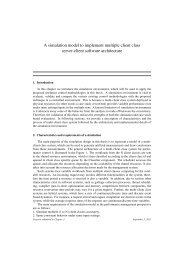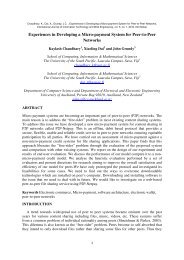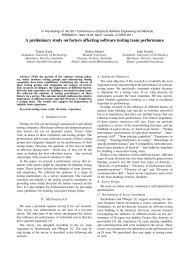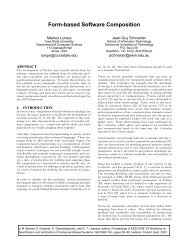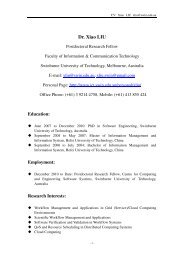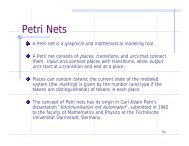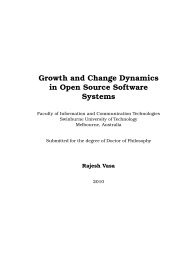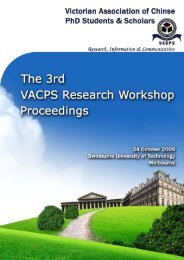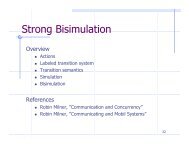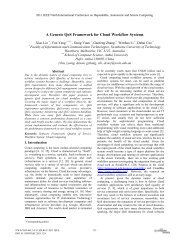Xiao Liu PhD Thesis.pdf - Faculty of Information and Communication ...
Xiao Liu PhD Thesis.pdf - Faculty of Information and Communication ...
Xiao Liu PhD Thesis.pdf - Faculty of Information and Communication ...
You also want an ePaper? Increase the reach of your titles
YUMPU automatically turns print PDFs into web optimized ePapers that Google loves.
on monitoring <strong>and</strong> detection <strong>of</strong> temporal violations (i.e. violations <strong>of</strong> temporal<br />
constraints) at workflow runtime, there is still no comprehensive framework which<br />
can support the whole lifecycle <strong>of</strong> time-constrained workflow applications in order<br />
to achieve high temporal QoS. Meanwhile, cloud computing adopts a marketoriented<br />
resource model, i.e. cloud resources such as computing, storage <strong>and</strong><br />
network are charged by their usage. Hence, the cost for supporting temporal QoS<br />
(including both time overheads <strong>and</strong> monetary cost) should be managed effectively in<br />
scientific cloud workflow systems.<br />
This thesis proposes a novel probabilistic temporal framework <strong>and</strong> its strategies<br />
for cost-effective delivery <strong>of</strong> high QoS in scientific cloud workflow systems (or<br />
temporal framework for short in this thesis). By investigating the limitations <strong>of</strong><br />
conventional temporal QoS related research, our temporal framework can provide a<br />
systematic <strong>and</strong> cost-effective support for time-constrained scientific cloud workflow<br />
applications over their whole lifecycles. With a probability based temporal<br />
consistency model, there are three major components in the temporal framework:<br />
Component 1 – temporal constraint setting; Component 2 – temporal consistency<br />
monitoring; Component 3 – temporal violation h<strong>and</strong>ling. Based on the investigation<br />
<strong>and</strong> analysis, we propose some new concepts <strong>and</strong> develop a set <strong>of</strong> innovative<br />
strategies <strong>and</strong> algorithms towards cost-effective delivery <strong>of</strong> high temporal QoS in<br />
scientific cloud workflow systems. Case study, comparisons, quantitative<br />
evaluations <strong>and</strong>/or mathematical pro<strong>of</strong>s are presented for the evaluation <strong>of</strong> each<br />
component. These demonstrate that our new concepts, innovative strategies <strong>and</strong><br />
algorithms for the temporal framework can significantly reduce the cost for the<br />
detection <strong>and</strong> h<strong>and</strong>ling <strong>of</strong> temporal violations while achieving high temporal QoS in<br />
scientific cloud workflow systems.<br />
Specifically, at scientific cloud workflow build time, in Component 1, a<br />
statistical time-series pattern based forecasting strategy is first conducted to predict<br />
accurate duration intervals <strong>of</strong> scientific cloud workflow activities. Afterwards, based<br />
on the weighted joint normal distribution <strong>of</strong> workflow activity durations, a<br />
probabilistic setting strategy is applied to assign coarse-grained temporal constraints<br />
through a negotiation process between service users <strong>and</strong> service providers, <strong>and</strong> then<br />
fine-grained temporal constraints can be propagated along scientific cloud<br />
workflows in an automatic fashion. At scientific cloud workflow runtime, in<br />
V


